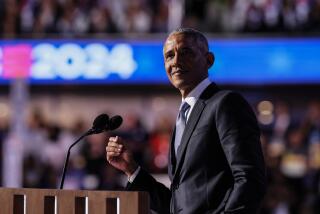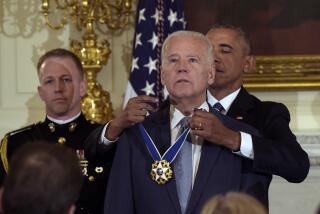Obama enjoys strong support
- Share via
Barack Obama approaches the White House with a deep well of public support, even though many doubt the president-elect can fulfill some key promises, according to a new Los Angeles Times/Bloomberg poll.
Less than six weeks before Obama’s history-making ascent to the Oval Office, the country is torn between hope for the future and concern about the present. Nine in 10 of those surveyed say the economy is in poor shape, with a substantial majority believing things are very bad. That finding matches the assessment in an October poll, which was the gloomiest since a Times survey taken during the 1991 recession.
There are, however, signs of budding optimism.
Although nearly two-thirds of those surveyed believe the country is headed in the wrong direction, the figure represents an improvement from October, when 84% said the country was on the wrong track. Nearly three-quarters of those surveyed feel positive about Obama’s election as president, a figure that includes not just an overwhelming majority of his fellow Democrats but a substantial majority of independents and nearly a third of Republicans.
Overall, nearly 8 in 10 approve of the way Obama has handled his transition to the White House and nearly three-quarters approve of his Cabinet picks. Strong majorities endorsed two of Obama’s most prominent choices: Democratic New York Sen. Hillary Rodham Clinton as secretary of State and Republican Robert M. Gates, a holdover from the Bush administration, as secretary of Defense.
“I think he’s intelligent and competent, and he’s picking intelligent, competent people,” said Ronald Griffey, 74, a retired meteorologist and political independent who lives in suburban Dallas.
Griffey agreed to a follow-up interview. “I like having an intelligent president instead of one you can drink a beer with,” he said.
Obama was elected last month in good part because he promised change, and despite some criticism from both left and right, most of those polled feel he has so far delivered.
Nearly 6 in 10 said Obama’s Cabinet selections were consistent with his promise to promote renewed bipartisanship -- although Democrats were much more likely to say so than independents or Republicans, underscoring the political division still facing the president-elect.
A similar percentage shrugged off the Washington pedigree of many Obama appointees, expressing confidence that they could help bring about change despite the years they spent working in President Clinton’s administration.
“Democrats tend to hold fundamentally different ideals than Republicans, so I tend not to look at it so much as former Clinton appointees than as people who will have different ideas than the ones who’ve been in charge the past eight years,” said independent Chris Adams-Easkold, 29, a heating and air conditioning mechanic in Sterling, Va.
Despite that abundant goodwill, however, there are doubts about how much Obama can accomplish once he takes office Jan. 20.
Although just over a quarter of those surveyed expressed confidence that he could achieve many of the goals he outlined during his campaign, a similar number said they expected him to accomplish few of those goals over the next four years. A plurality, 44%, said they expected Obama to accomplish some, but not all, of what he has proposed.
Dave Anderson, 43, a student and political independent in Lacey, Wash., was one of the skeptics. “Politicians always promise a lot, but they have to get what they’re promising passed by other politicians -- and they all have their own agendas,” Anderson said.
Fewer than half of those surveyed believe Obama will manage to withdraw all combat troops from Iraq within 16 months, as promised, and only about 4 in 10 believe he will be able to provide affordable healthcare coverage for all Americans. Nearly half believe he will not be able to deliver on his healthcare promise.
There was more optimism about other aspects of the upcoming Obama administration.
Nearly 6 in 10 believe he will be able to reduce the country’s dependence on oil and increase the use of alternative energy sources. More than two-thirds said they trust Obama to keep the nation secure, and an overwhelming majority said they expect Obama and his economic team to remedy some aspects of the nation’s financial crisis -- though Democrats were far more optimistic than independents or Republicans.
Overall, 4 in 10 said they expected Obama’s policies to make them personally better off, 15% said worse off, and the rest said they expected their circumstances to stay about the same, or were uncertain.
Obama has offered suggestions regarding the federal government’s economic rescue efforts but has drawn criticism from lawmakers on Capitol Hill for not doing more. His approach drew a mixed response in the survey.
Nearly half said the president-elect should be working closely with President Bush to help solve the nation’s financial crisis, but about the same number said Obama should not get more deeply involved before assuming office.
“He’s not the president, so he doesn’t have the power,” said Odalis Tejada, 36, a New Jersey independent and quality inspector in the garment industry. “It makes sense for him to keep on top of what’s going on. But until he has the power, it’s not like he can go over the president’s head.”
Looking ahead to the next four years, about 7 in 10 expressed some confidence that Democrats and Republicans in Congress would be able to work together in a bipartisan fashion. That reflects a burst of optimism and, perhaps, the honeymoon Obama is enjoying.
When the question was asked two years ago, after Democrats took control of Congress, Americans were evenly divided on whether the result would be more or less gridlock.
In 1997, after President Clinton’s reelection, a 43% plurality expressed little confidence that Democrats and Republicans -- who were then in charge of Congress -- would work together across party lines.
The Los Angeles Times/Bloomberg poll, under the supervision of Times Poll Director Susan Pinkus, conducted interviews Saturday through Monday with 1,000 adults nationwide.
The margin of sampling error is plus or minus 3 percentage points.
--
More to Read
Get the L.A. Times Politics newsletter
Deeply reported insights into legislation, politics and policy from Sacramento, Washington and beyond. In your inbox twice per week.
You may occasionally receive promotional content from the Los Angeles Times.











